More on this book
Community
Kindle Notes & Highlights
Scientists, it should already be clear, never learn concepts, laws, and theories in the abstract and by themselves. Instead, these intellectual tools are from the start encountered in a historically and pedagogically prior unit that displays them with and through their applications.
Normal science can proceed without rules only so long as the relevant scientific community accepts without question the particular problem-solutions already achieved.
When scientists disagree about whether the fundamental problems of their field have been solved, the search for rules gains a function that it does not ordinarily possess. While paradigms remain secure, however, they can function without agreement over rationalization or without any attempted rationalization at all.
Therefore, it can simultaneously determine several traditions of normal science that overlap without being coextensive. A revolution produced within one of these traditions will not necessarily extend to the others as well.
That distinction between discovery and invention or between fact and theory will, however, immediately prove to be exceedingly artificial.
Discovery commences with the awareness of anomaly, i.e., with the recognition that nature has somehow violated the paradigm-induced expectations that govern normal science.
discovering a new sort of phenomenon is necessarily a complex event, one which involves recognizing both that something is and what it is.
Only when all the relevant conceptual categories are prepared in advance, in which case the phenomenon would not be of a new sort, can discovering that and discovering what occur effortlessly, together, and in an instant.
the perception of anomaly—of a phenomenon, that is, for which his paradigm had not readied the investigator—played an essential role in preparing the way for perception of novelty.
the perception that something had gone wrong was only the prelude to discovery.
the decision to employ a particular piece of apparatus and to use it in a particular way carries an assumption that only certain sorts of circumstances will arise.
There are instrumental as well as theoretical expectations, and they have often played a decisive role in scientific development.
But not all theories are paradigm theories. Both during pre-paradigm periods and during the crises that lead to large-scale changes of paradigm, scientists usually develop many speculative and unarticulated theories that can themselves point the way to discovery.
the previous awareness of anomaly, the gradual and simultaneous emergence of both observational and conceptual recognition, and the consequent change of paradigm categories and procedures often accompanied by resistance.
In science, as in the playing card experiment, novelty emerges only with difficulty, manifested by resistance, against a background provided by expectation.
Anomaly appears only against the background provided by the paradigm.
a last attempt to reinforce conviction about their existence and nature seems called for.
reasons why revolutions have proved to be so nearly invisible. Both scientists and laymen take much of their image of creative scientific activity from an authoritative source that systematically disguises—partly
the existence and significance of scientific revolutions.
As the source of authority, I have in mind principally textbooks of science together with both the popularizations and the philosophical works modeled on them.
All three record the stable outcome of past revolutions and thus display the bases of the current normal-scientific tradition.
In short, they have to be rewritten in the aftermath of each scientific revolution, and, once rewritten, they inevitably disguise not only the role but the very existence of the revolutions that produced them.
science textbooks (and too many of the older histories of science) refer only to that part of the work of past scientists that can easily be viewed as contributions to the statement and solution of the texts’ paradigm problems.
But scientists are more affected by the temptation to rewrite history, partly because the results of scientific research show no obvious dependence upon the historical context of the inquiry, and partly because, except during crisis and revolution, the scientist’s contemporary position seems so secure.
The result is a persistent tendency to make the history of science look linear or cumulative,
the textbook tendency to make the development of science linear hides a process that lies at the heart of the most significant episodes of scientific development.
science has reached its present state by a series of individual discoveries and inventions that, when gathered together, constitute the modern body of technical knowledge.
pedagogic form has determined our image of the nature of science and of the role of discovery and invention in its advance.


